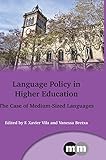Language Policy in Higher Education : The Case of Medium-Sized Languages / ed. by F. Xavier Vila Moreno, Vanessa Bretxa.
Material type: TextSeries: Multilingual MattersPublisher: Bristol ; Blue Ridge Summit : Multilingual Matters, [2014]Copyright date: ©2014Description: 1 online resource (240 p.)Content type:
TextSeries: Multilingual MattersPublisher: Bristol ; Blue Ridge Summit : Multilingual Matters, [2014]Copyright date: ©2014Description: 1 online resource (240 p.)Content type: - 9781783092758
- 9781783092765
- 306.44/9 306.449
- LC201.5 .L37 2014
- LC201.5 .L364 2015
- online - DeGruyter
- Issued also in print.
| Item type | Current library | Call number | URL | Status | Notes | Barcode | |
|---|---|---|---|---|---|---|---|
 eBook
eBook
|
Biblioteca "Angelicum" Pont. Univ. S.Tommaso d'Aquino Nuvola online | online - DeGruyter (Browse shelf(Opens below)) | Online access | Not for loan (Accesso limitato) | Accesso per gli utenti autorizzati / Access for authorized users | (dgr)9781783092765 |
Frontmatter -- Contents -- Tables and Figures -- Contributors -- 1. Language Policy in Higher Education in Medium-Sized Language Communities: An Introduction -- 2. The Position of Danish, English and Other Languages at Danish Universities in the Context of Danish Society -- 3. The Position of Czech and Other Languages at Universities in the Czech Republic: Some Initial Observations -- 4. The Position of Finnish and Swedish as well as Other Languages at Universities in Finland -- 5. Challenges for Hebrew in Higher Education and Research Environments -- 6. Challenges for South Africa's Medium-Sized Indigenous Languages in Higher Education and Research Environments -- 7. The Position of Catalan in Higher Education in Catalonia -- 8. Medium-Sized Languages as Viable Linguae Academicae -- Index
restricted access online access with authorization star
http://purl.org/coar/access_right/c_16ec
In today's increasingly interconnected, knowledge-based world, language policy in higher education is rapidly becoming a crucial area for all societies aiming to play a part in the global economy. The challenge is double faceted: how can universities retain their crucial role of creating the intellectual elites who are indispensable for the running of national affairs and, at the same time, prepare their best-educated citizens for competition in a global market? To what extent is English really pushing other languages out of the academic environment? Drawing on the experience of several medium-sized language communities, this volume provides the reader with some important insights into how language policies can be successfully implemented. The different sociolinguistic contexts under scrutiny offer an invaluable comparative standpoint to understand what position can - or could - be occupied by each language at the level of higher education.
Issued also in print.
Mode of access: Internet via World Wide Web.
In English.
Description based on online resource; title from PDF title page (publisher's Web site, viewed 24. Apr 2022)


